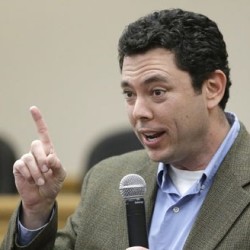Rep. Chaffetz’ Anti-online Gambling Bill By End Of March

According to M.J. Henshaw, a spokeswomen acting on behalf of U.S. Representative Jason Chaffetz (R-Utah), the Republican Congressman is planning on introducing an anti-online gambling bill to Congress on Wednesday, 26th March, designed to “restore longstanding United States policy that the Wire Act prohibits all forms of Internet gambling.”
UIGEA re-interpreted in 2011 to allow poker
In 1961, Congress introduced the Interstate Wire Act which prohibited the operation of most gambling businesses inside the country, and by 2006 the Unlawful Internet Gambling Enforcement Act (UIGEA) was passed which targeted the USA’s online gaming market. By 2011 the U.S. Justice Department subsequently managed to shut down PokerStars, Full Tilt Poker and Absolute Poker to dismantle the country’s prospering online poker industry.
The same year that the big poker rooms were chased out of the USA, however, the 2006 UIGEA was re-interpreted to apply only to sports betting, thus paving the way for legalized state-by-state online gambling. In 2013, Nevada, Delaware and New Jersey then regulated online gambling, and currently a dozen other states are also considering joining the nascent industry.
Internet gambling draws backlash from gambling opponents
In spite of more than three months of active US online gambling and operators having spent millions of dollars developing their products, gambling opponents in Congress are now gearing up to release legislation designed to reverse the 2011 reinterpretation and ban internet gambling throughout the USA.
The bill drafted by Congressman Chaffetz (R-Utah), is called the “The Internet Gambling Control Act” and aims to ensure online gambling, state lotteries and sports betting are re-included in the blanket ban, although horse racing has been left off the list. The bill will also run at the same time as U.S. Senator Lindsey Graham’s (R-South Carolina) proposed federal bill which once again aims to expand the Wire Act of 1961.
“For 50 years the Wire Act was interpreted one way, and then two days before Christmas, the DOJ decides to change that interpretation. The bill would restore the original interpretation of the Wire Act pre-December 2011, the one that was issued by the DOJ,” commented spokeswoman M.J. Henshaw.
Adelson lobbyist behind Chaffetz’s bill to ban online gambling
Billionaire Las Vegas Sands CEO Sheldon Adelson is seen as playing a pivotal role in lobbying efforts to ban online gambling, with his Coalition to Stop Internet Gambling recently rattled by an interstate online poker compact signed between the regulated markets of Nevada and Delaware.
Back in Rep. Jason Chaffetz’s home state of Utah all forms of gambling are banned, and lending their support to Chaffetz’s efforts to introduce federal anti-online gambling legislation consistent with their own highly publicized goals, the Adelson-backed Coalition to Stop Internet Gambling, stated:
“We support and applaud all efforts to restore the long-standing interpretation that the Wire Act prohibits Internet gambling. It’s common sense that putting a virtual casino in the pocket of every American with a smartphone is bad public policy.”
What chance does the bill have of succeeding?
Whereas land-based casino moguls, such as Sheldon Adelson and Steve Wynn, have been campaigning against their perceived online competitors, other gambling interests, including Caesars Entertainment and MGM Resorts International, view online gambling in all together more favorable light. In fact, to them internet gambling is seen as an opportunity to gain greater recognition for their brands, attract younger players and develop new revenue streams for their businesses.
Consequently, pro-gambling advocates are concerned Sheldon Adelson’s promise to spend “whatever it takes” lobbying to have online gaming prohibited will have a significant affect on the bill´s overall chance of success. In their favor, however, is a likely nationwide objection to banning online lotteries, the revenues already being earned by the three regulated states, as well as well-founded fears that in the event of a ban players will simply continue playing on unregulated US-friendly poker sites.
“Banning all online gaming nationwide, as this bill effectively does, would put American consumers at serious risk. It is impossible to stand in the way of the Internet; instead, we should embrace and shape these new technologies in a way that is safe for consumers,” explained Republican Reps. Mary Bono (R-Calif).
Nevertheless, at this early stage it is too early to call how the issue will play out on Capitol Hill, and as one spokesperson said, “All bets are off.”










